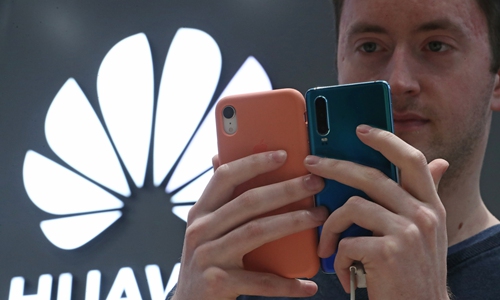HOME >> SOURCE
Huawei may cut 5G phone orders in March amid weakening demand
Source:Global Times Published: 2020/3/8 19:58:40

A customer views smartphones in a Huawei store at the Aviapark shopping mall in Moscow. Photo: VCG
Huawei is likely to reduce 5G phone orders in March amid a weakening Chinese market due to the impact of COVID-19, analysts said, adding that the move will help digest inventories that were prepared for holiday sales - which according to media reports, stood at 40-50 million.
The number is almost equivalent to Huawei's smartphone shipments in the fourth quarter of 2019, which amounted to 56.2 million units.
"It's possible that Huawei may cut orders in March amid the epidemic, since it may have excess inventories due to sluggish sales during the Spring Festival holiday, which should have been a 'perfect time' to reduce its stockpiles," a Huawei supplier, who asked to remain anonymous, told the Global Times on Sunday.
The supplier expected orders to rebound in April.
Due to Huawei's surging sales in the domestic market in 2019, the company could also have more phones in stock than other vendors, Xiang Ligang, a veteran industry analyst said, adding that too much inventory will exert huge pressure on the phone-makers' liquidity.
The COVID-19 outbreak has hobbled China's smartphone market. According to an IDC report, China is likely to see its smartphone shipments plummet by 40 percent in the first quarter of 2020, which has resulted in some factory shutdowns.
Will Wong, an IDC research manager, predicts that even if the market could see signals of a quick recovery in March, it could not reach the same level as in 2019.
"Due to the epidemic, not only Huawei but other global smartphone makers are adjusting their production pace, to counter the side effects and a weak market," Ma Jihua, a Beijing-based industry analyst, told the Global Times on Sunday.
Apple said in February that it does not expect to meet its quarterly revenue forecast because of lower iPhone supplies and lower Chinese demand amid the coronavirus outbreak. The US technology giant said that it expected to achieve net sales of between $63 billion to $67 billion in its fiscal second quarter in 2020.
Ma also said the rapid development of the 5G market makes it more urgent for Huawei to deplete its inventories, which include both 4G and 5G handsets, to make room for new phone sales. Huawei, along with other Chinese phone-makers including Xiaomi, Vivo and OPPO, have launched or prepared to launch new 5G phones.
However, the time for large-scale 5G phone purchases in the domestic market has not come yet, posing difficulties for Huawei and its distributors to sell its stockpiles, since 5G infrastructure rollout across the country has not been completed yet, Ma said.
Industry insiders cautioned that the cut in orders may also affect the whole industry chain and hurt the prospects of any companies that are involved, including Taiwan-based TSMC.
Huawei 's smartphones inventory is about 40 to 50 million, according to a report from Taiwan news site money.udn.com. Based on that prediction, Huawei's cut in orders will affect around 20,000 wafers, equivalent to around 20 percent of TSMC 's 7-nanometer production capacity in the second quarter of this year.
Posted in: COMPANIES,BIZ FOCUS